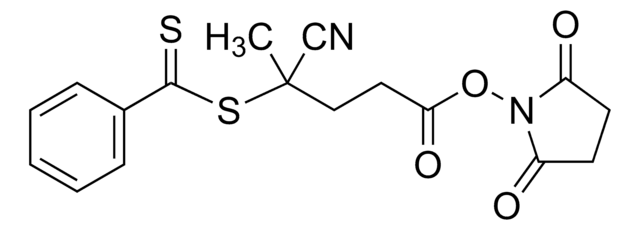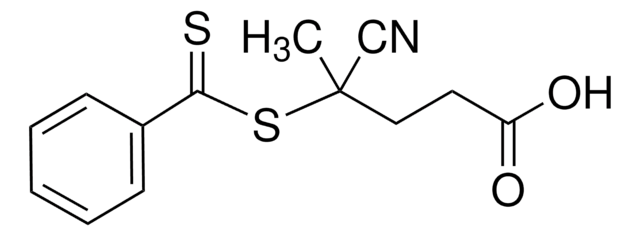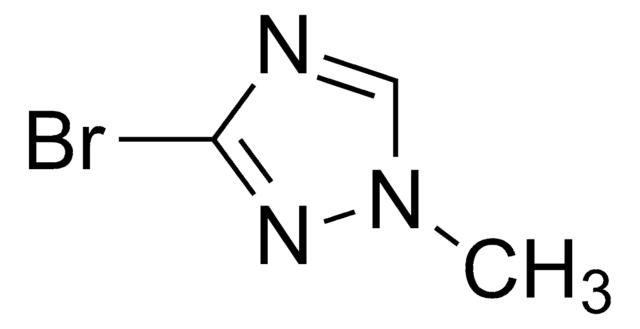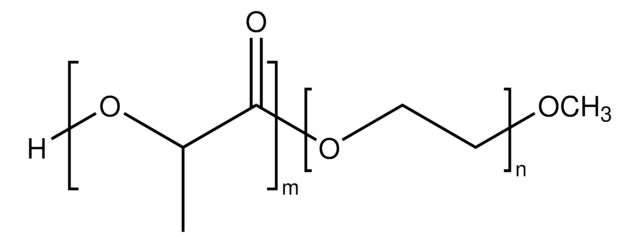764914
Poly(ethylene glycol) 4-cyano-4-(phenylcarbonothioylthio)pentanoate
average Mn 2,000
Synonym(e):
PEG CTA, PEG RAFT
About This Item
Empfohlene Produkte
Beschreibung
PEG average Mn 2,000 n~44
Qualitätsniveau
Form
powder
Mol-Gew.
average Mn 2,000
mp (Schmelzpunkt)
47-52 °C
PDI
≤1.1
Lagertemp.
2-8°C
Suchen Sie nach ähnlichen Produkten? Aufrufen Leitfaden zum Produktvergleich
Allgemeine Beschreibung
Anwendung
Signalwort
Warning
H-Sätze
Gefahreneinstufungen
Skin Sens. 1
Lagerklassenschlüssel
11 - Combustible Solids
WGK
WGK 3
Flammpunkt (°F)
Not applicable
Flammpunkt (°C)
Not applicable
Hier finden Sie alle aktuellen Versionen:
Analysenzertifikate (COA)
Die passende Version wird nicht angezeigt?
Wenn Sie eine bestimmte Version benötigen, können Sie anhand der Lot- oder Chargennummer nach einem spezifischen Zertifikat suchen.
Besitzen Sie dieses Produkt bereits?
In der Dokumentenbibliothek finden Sie die Dokumentation zu den Produkten, die Sie kürzlich erworben haben.
Artikel
Reversible addition–fragmentation chain transfer (RAFT) polymerization is rapidly moving to the forefront in construction of drug and gene delivery vehicles.
The modification of biomacromolecules, such as peptides and proteins, through the attachment of synthetic polymers has led to a new family of highly advanced biomaterials with enhanced properties.
Humankind has utilized protein materials throughout its existence, starting with the use of materials such as wool and silk for warmth and protection from the elements and continuing with the use of recombinant DNA techniques to synthesize proteins with unique and useful properties.
Unser Team von Wissenschaftlern verfügt über Erfahrung in allen Forschungsbereichen einschließlich Life Science, Materialwissenschaften, chemischer Synthese, Chromatographie, Analytik und vielen mehr..
Setzen Sie sich mit dem technischen Dienst in Verbindung.

![Poly(ethylene glycol) methyl ether 4-cyano-4-[(dodecylsulfanylthiocarbonyl)sulfanyl]pentanoate average Mn 10,000](/deepweb/assets/sigmaaldrich/product/structures/618/250/98532519-ae4b-4fc4-b6f0-fb15f144c8f1/640/98532519-ae4b-4fc4-b6f0-fb15f144c8f1.png)


![Poly(ethylene glycol) bis[2-(dodecylthiocarbonothioylthio)-2-methylpropionate] average Mn 10,800](/deepweb/assets/sigmaaldrich/product/structures/369/930/ba9a86e7-8635-4a23-aa7c-7db94c295272/640/ba9a86e7-8635-4a23-aa7c-7db94c295272.png)

![4-Cyano-4-[(Dodecylsulfanylthiocarbonyl)sulfanyl]pentansäure 97% (HPLC)](/deepweb/assets/sigmaaldrich/product/structures/204/925/30ae6ca0-5b0b-4963-a061-7e5e3d1a85af/640/30ae6ca0-5b0b-4963-a061-7e5e3d1a85af.png)


